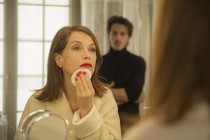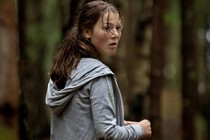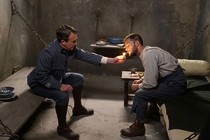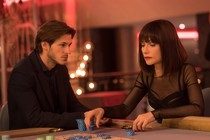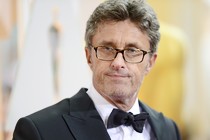Review: Eva
- BERLIN 2018: Benoît Jacquot delves into a world that is poisonous, opaque and strange, hinged on a game of mirrors between Gaspard Ulliel and Isabelle Huppert

Deception, lies, calculation and self-interest… When Benoît Jacquot made the decision to adapt James Hadley Chase’s eponymous novel, following in the footsteps of Joseph Losey who’d embarked upon this same project in 1962, the seasoned French filmmaker knew he would be entering into a world of inevitability, where audience empathy for the largely unpleasant characters of the film would hang by a thread. In fact, with Eva [+see also:
trailer
interview: Benoît Jacquot
film profile], unveiled in competition at the 68th Berlin Film Festival, the intention seems not so much to seduce the audience (except through its outstanding offering of twilight photography), but rather to instil a feeling of malaise, of being trapped in an ill-fated and nightmarish world of unconscious impulses and wavering certainties. It certainly seems to fulfil these ambitions; perhaps too well, as the strangeness of Eva in its entirety actually ends up working against the film, much in the same way that the shadow of the author whose work is stolen by Bertrand (the film’s lead) weighs down heavily on the latter and ultimately threatens to consume him.
It all begins with an ill-gotten gain at the expense of a dead man: a stage play is stolen by Bertrand (Gaspard Ulliel) during a breath-taking opening sequence where the gigolo-come-care assistant stands by and watches while an old has-been writer is steadily consumed by a heart attack in his bathtub. Fast-forward in time, and Bertrand has become a successful Parisian playwright, living the perfect love with an attractive partner (Julia Roy) who is as resplendently blond as she is innocent. But our fraudulent lead is faced with a very serious dilemma on which his usurped status, his financial and sentimental wellbeing and his future all depend: he must now produce a new literary text. This is a task which he is very clearly incapable of and so he steals away, under the pretext of looking for inspiration, to a Savoyard chalet that two strangers have broken into to take shelter from a snow storm. One of these strangers is a woman, in a bathtub (cf. the beginning of the film), called Eva (Isabelle Huppert) who is a prostitute and who proceeds to knock out an overly-forward Bertrand ("how do you fancy switching clients?"). Theirs is an electrifying first contact, followed some time afterwards by a second random meeting (around a roulette table, in a casino in Annecy, a town where Bertrand’s play is showing). A relationship forms - though with a price-tag attached as Eva is a rather high-class prostitute (and is she alone?) - a relationship that is of increasing importance to Bertrand who happily uses it as the subject of his new text, all the while harbouring a rather confused attraction for this ultra-realistic woman with whom, at first glance, he seems to have quite a lot in common…
With cool elegance, Benoît Jacquot steers the audience through the sinuous recesses of a story (co-authored by Gilles Taurand) swathed in Julien Hirsch’s beautiful photography. But in doing so, Jacquot does to some extent lose himself in the gulf that is gradually opening between classic film noir codes and the shifting sands of psychoanalytical mirrors. Through no fault of their own, the two main actors don’t seem entirely comfortable in the shifting and opaque characters that they play, and the twists that bring about a rather abrupt end to the film only serve to heighten the sense of bewilderment caused by the overall strangeness of the film. But this potential sticking point detracts in no way from the great formal quality of Eva and its existence was clearly intended by Jacquot, a director who is ultimately caught in his own trap while exploring the mysteries of identity.
Produced by Macassar, Eva was co-produced by Arte France Cinéma, NJJ Entertainment, Scope Pictures and EuropaCorp who is managing international sales of the film.
(Translated from French)
Did you enjoy reading this article? Please subscribe to our newsletter to receive more stories like this directly in your inbox.
















